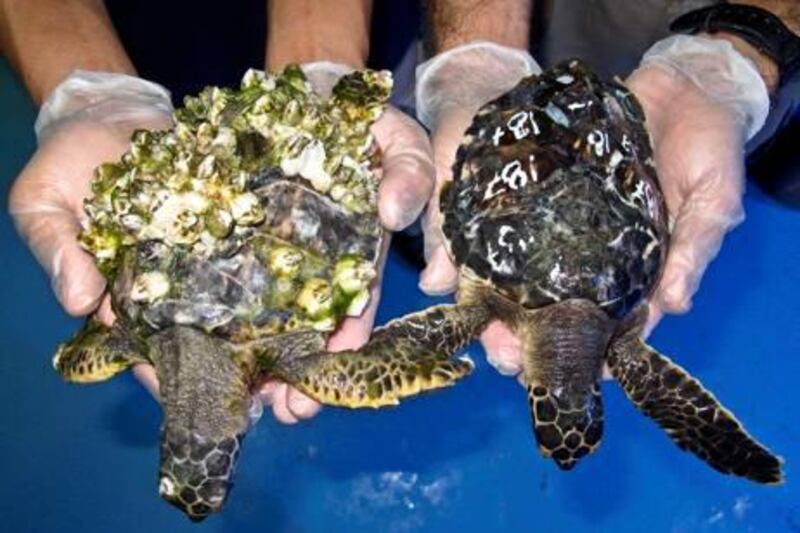DUBAI // A record number of sick and injured marine turtles have been received by the Dubai Turtle Rehabilitation Project since December, with lack of food blamed for the steep increase.
The total of 210 turtles received by the project is significantly higher than in recent years. By 2008, the project was receiving just 20 turtles each year.
The turtles are usually washed ashore during the winter months, with 45 animals found on one day in January, said Kevin Highland, a wildlife expert with The Wildlife Protection Office.
"We hope not to make records of sick animals, but yes, this is the most we have had," he said.
Dr Ulrich Wernery, the scientific director of the Central Veterinary Research Laboratory (CVRL) in Dubai, which works with the rehabilitation project, said he believed the main reason for the sickness and deaths was that the animals had not been feeding properly.
"When we opened the turtles, they had nothing in the stomach, nothing in the intestines," he said. "There was otherwise nothing wrong with them. They were completely normal."
"The reasons why they do not eat, I don't know. Perhaps they cannot find enough food."
Most of the affected turtles are of the endangered Hawksbill variety, which mainly feeds on sea sponges and jellyfish.
The lack of food may be an indicator of the decline in coral reefs, which provide them with food.
The rehabilitation project, a collaboration between The Wildlife Protection Office and Jumeirah's Aquarium team, has released 110 recovered turtles since it began operations in 1996.
Essential veterinary support is provided by Al Wasl Veterinary Clinic and Dubai Falcon Hospital, with laboratory work provided by the CVRL.
The project also works Dubai Municipality and the Emirates Marine Environmental Group.
Mr Highland said a possible explanation for this year's large number could centre on logistics. As awareness of the rescue centre spread, more people knew to who to contact when they found a worse-for-wear turtle.
The CVRL carries out autopsies on all turtles. Since December last year, 11 turtles had arrived at the lab, Dr Wernery said.
Ten of them had severe infections caused by a common waterborne bacteria, Aeromonas.
"This is a common bacteria, but it can be pathogenic if an animal is sick," he said. "It had invaded the animals but we believe it was a secondary infection, not the primary cause of death."
The turtles were recovering well, Mr Highland said.
Five are living in small enclosures under heat lamps to help speed up their metabolism. The rest are recovering at facilities at the Burj Al Arab, the Madinat Jumeirah and Mina A'Salam hotel.
A second pre-release turtle holding pen was built earlier this month in the waterways next to The Wharf restaurant at Mina A'Salam. The enclosures are open to the general public.
Last year, the centre released 42 turtles back into waters off the coast of Dubai. More are due for release in the coming months.
Anyone finding a sick or injured turtle can call 04-301 7198 and leave a message for the Jumeirah Aquarium team, or e-mail baaaquarium@jumeirah.com
vtodorova@thenational.ae





